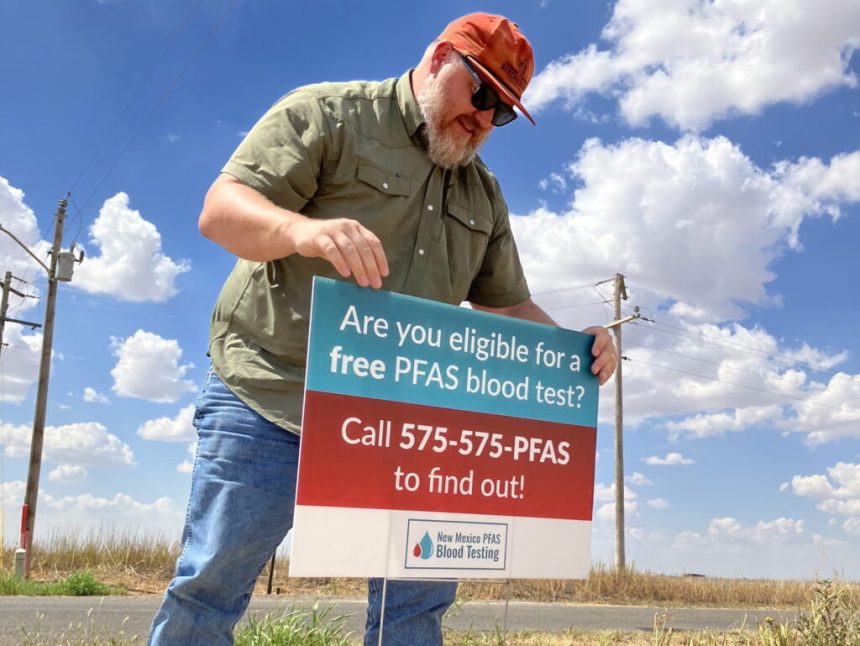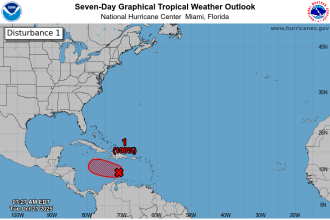An undated photo of Jaben Richards, a program manager at the state’s Groundwater Quality Bureau places a sign advertising blood testing in Curry County, New Mexico. (Courtesy of New Mexico Envrionment Department)
Blood tests from all but two of more than 600 residents around Cannon Air Force Base found so-called “forever chemicals” associated with firefighting foams, which have contaminated surrounding groundwater, according to a report released Thursday by the New Mexico Environment Department.
While the presence of the chemicals in 99% of the 628 samples is on par with national studies showing the level the group of chemicals known as PFAS appears in most people’s blood, New Mexico environment officials said the key finding of the study was types of chemicals present.
“That shows a correlation between what’s in their blood and what came from military operations at Cannon Air Force Base,” Environment Secretary James Kenney said in an interview with Source NM ahead of the report’s release Wednesday.
Cannon Air Force Base officials when reached by phone Wednesday said they could not immediately provide a response because the report was not yet public. Source NM will update the story with any further comment.
Of the 33 compounds tested for in the blood of residents outside of nearby Clovis, the four most prevalent substances are ingredients found in currently or historically in aqueous film-forming foams, or the type of suppressant used to put out fires from flammable liquids like gasoline.
The report also found that 14 people tested had very high PFAS levels, similar to levels found in other states where the chemicals were manufactured or spilled. For comparison, only an estimated 9% of adults nationwide have those levels present.
“I think it’s profoundly disappointing that we have 14 New Mexicans who are in that highest national tier from the Cannon Air Force Base’s foams migrating offsite,” Kenney said. “We don’t make the chemicals in New Mexico, they’re only used here in that concentration and that significance in military operations, and they think this is that direct link that has been missing, but now proven.”
New Mexicans working or living closer to the PFAS-contaminated groundwater plume under Cannon had PFAS levels that were three times higher than residents not working or living near the plume, according to the report.
The blood test results are from a 2024 state program to collect samples in 2024 from residents in surrounding Curry County immediately surrounding the base, in partnership between environment officials and New Mexico Department of Health. Participants were alerted to their results in the spring.
There’s been a rising awareness to address contamination from PFAS, an abbreviation for perfluoroalkyl and polyfluoroalkyl substances, a class of synthetic chemicals used in the manufacture of everything from rugs to cookware to firefighting foams. The foams, first used in the 1970s are effective for fighting high-heat fires from jet fuel ignition, hence the prevalence of their uses on Air Force Bases.
PFAS were first detected in soil and groundwater in 2018 near Cannon Air Force Base, with state officials alleging that the military’s use of firefighting foams over decades seeped into the soils and water. A dairy with contaminated wells was required to euthanize more than 3,000 cows and brought the miles-long plume to light.
These chemicals resist breaking down in nature and can accumulate in water, soils and increasingly in the blood and bodies of humans and animals around the world. While their harms are still being studied, researchers have linked PFAS exposure to a wide range of health issues such as: decreased fertility, fetal developmental delays, increases in certain cancer risks, disruption of immune responses and more, according to the U.S. Environmental Protection Agency.
Efforts to address PFAS pollution nationally are estimated to cost billions of dollars as cleanup efforts stretch for years. New Mexico’s PFAS contamination is concentrated around military bases including Cannon Air Force Base, Holloman Air Force Base, Kirtland Air Force Base, White Sands Missile Range and Fort Wingate.The state has spent more than $10 million between investigations, damages, legal costs and cleanup, according to court filings.
While the military has previously promised to end PFAS use, top officials are saying they cannot meet the deadline to find an alternative in 2026, according to U.S. Secretary of Defense Pete Hesgeth’s statements to the Government Accountability Office in July.
“If this can happen in Curry County, it can happen in Anywhere, USA,” Kenney said. “They’ve authorized the use of these firefighting foams for another year, and the Department of Defense is going to be releasing these into communities all over the country.”
New Mexico is embroiled in several lawsuits over PFAS contamination. New Mexico is part of multi-state litigation in South Carolina, which includes a combined 10,000-plus cases against military and civilian PFAS contamination.
The state is also involved in separate litigation in the federal court system, after the U.S. Department of Defense sued the state, claiming it overstepped its authority in mandating cleanup.
In a new case filed this year, state officials alleged Cannon Air Force failed to address contamination, including barring state inspectors entry to the base to test for PFAS. The Department of Defense requested the case move to federal court, which was granted in August.
Sen. Pat Woods, a Republican from Clovis, told Source NM the state appropriated $12 million to pay to connect residents to city water, replacing contaminated, private wells.
“In the short run, we’re going to do some of these shorter pipelines to help Clovis citizens that have contaminated water and high levels in their bloodstream,” Woods said. “We didn’t cause the problem, but we’re proposing a solution to the problem.”
The New Mexico Environment Department will hold a public meeting on Thursday Oct. 23 in Curry County to present the report’s findings.
SUBSCRIBE: GET THE MORNING HEADLINES DELIVERED TO YOUR INBOX









